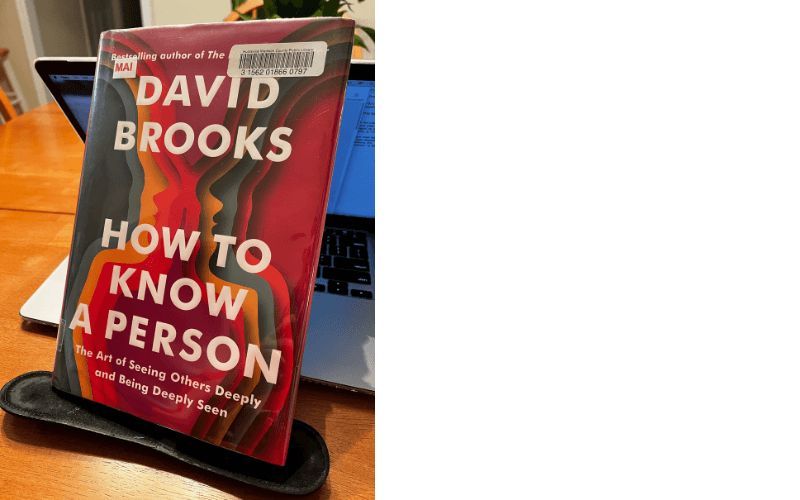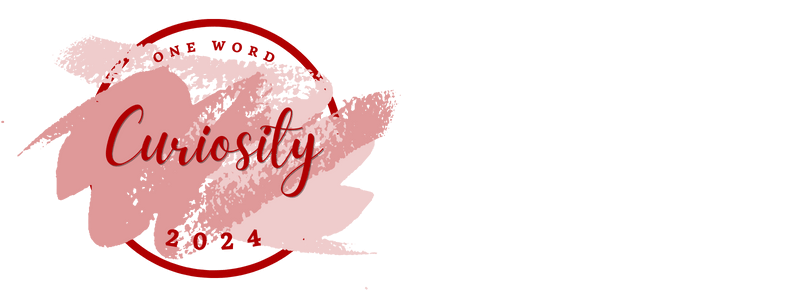For the 2024 edition of “Share 4 Somethings,” Jennifer asks us to share each month:
- Something loved and/or disliked
- Something accomplished
- Something improved upon and/or that needs improvement
- Something noticed
I also share my previous month’s One Second Everyday video . . .
~ * ~ * ~ * ~
Something Loved
- HOW TO KNOW A PERSON
I just finished reading a book I now love so much: How to Know a Person: The Art of Seeing Others Deeply and Being Deeply Seen by David Brooks.

The book is about humans (I’m still partial to the topic; it was my One Word for 2023). About relationships between humans. And about learning how to make better connections with other humans.
Brooks is an experienced columnist for the New York Times, so his words flow smoothly and can be read easily. But that doesn’t mean his words or message is simple. He addresses many hard topics and gives us difficult advice.
Here is a snippet of one action step in the book that we can all work on.
“As soon as somebody starts talking about times when they felt excluded, betrayed, or wronged, stop and listen. When somebody is talking to you about pain in their life, even in those cases when you may think their pain is performative or exaggerated, it’s best not to try to yank the conversation back to your frame.
Your first job is to stay within the other person’s standpoint to more fully understand how the world looks to them. Your next job is to encourage them to go into more depth about what they have just said.”
~ * ~ * ~ * ~
Something Accomplished
- READ ONE BOOK AT A TIME? WHAT?
My normal mode of reading is to keep several books going at one time. It’s my favorite approach. I like having options when I sit down to read.
But because How to Know a Person was a library book, with others waiting in line for it, I had to read it within my allotted two weeks. Which meant foregoing other books.
And I did it! I read just one book at a time. This is an accomplishment for me. (Maybe the internet hasn’t totally ruined my attention span yet?)
But I’m not giving you advice to only read one book at a time (I won’t continue it myself). But neither will I give you advice to read several books at once. Do whatever works for you.
Here’s a caution from Brooks about giving advice.
“I told [my depressed friend] he should [do his service project] again, since he has found it so rewarding. I did not realize that it was energy and desire he lacked, not ideas about things to do.
It was only later that I read that when you give a depressed person advice on how they can get better, there’s a good chance all you are doing is telling the person that you just don’t get it.
I learned, very gradually, that a friend’s job in these circumstances is not to cheer the person up. It’s to acknowledge the reality of the situation; it’s to hear, respect, and love them; it’s to show them you haven’t given up on them, you haven’t walked away.“
~ * ~ * ~ * ~
Something that Needs Improvement
- WRITE ABOUT FRIENDSHIP
For the past two and a half years, I’ve been wrestling with a deeply painful circumstance in my life. I’ve been learning a lot about myself (and learning I have more to learn), but I’ve been learning more about other people, too.
I’ve had some friends/family members/spouse who have been amazing human companions alongside me on this difficult journey. They didn’t give up on me and walk away. They’re still here, staying beside me through the emotional trauma. And I’ve wanted to capture this phenomena in words.
But I can’t seem to pull it together yet. Maybe it will be a project for this summer.
In How to Know a Person, Brooks calls these helpful people Illuminators because they shine the brightness of their care on people.
“The Illuminator is not just there to see the depths of your pain, she’s there to see your strength, to celebrate with you in your triumphs.”
I’ve had Illuminators shine on me. They’ve helped save my life. Maybe one day I’ll be able to express my thanks for them more clearly.
~ * ~ * ~ * ~
Something Noticed
- LISTEN TO THE WITNESSES
I’ve been sharing lately about my special friend V. She had a bout in the hospital this week with an infection. When I visited her yesterday, I couldn’t get her to wake up and talk. Not even when I played her favorite Elvis songs and Hall & Oates music (although I’m certain her feet moved a bit on the livelier tunes).
But her stillness worried me. The nurse on duty noticed.
So a couple hours after I got back home, the nurse called me. She said that V had woken up in great spirits, talking and cutting up and telling everyone how much she loved Elvis. Maybe she had been more awake than I’d realized.
I was so grateful for the nurse who noticed my concern, and followed up with the phone call.
In How to Know a Person, Brooks quotes Pope Paul VI on witnesses: “Modern man listens more willingly to witnesses than teachers, and if he does listen to teachers, it’s because they are witnesses.”
Then later Brooks says himself:
“People don’t see the world with their eyes; they see it with their entire life.”
I’m thankful for people like that nurse who saw me not with just her eyes, and heard me not with just her ears, but used her whole life experience to understand what I was feeling. And then cared enough to do something about it.
What is something you are loving, accomplishing, improving, or noticing this month? Have you read How to Know a Person?




